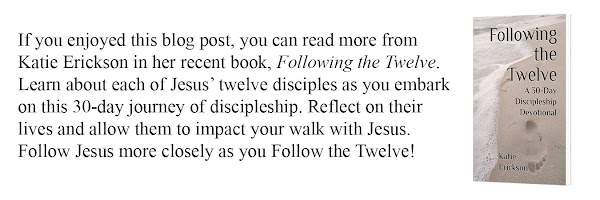Then she kissed them goodbye and they wept aloud and said to her, “We will go back with you to your people.”
But Naomi said, “Return home, my daughters. Why would you come with me? Am I going to have any more sons, who could become your husbands? Return home, my daughters; I am too old to have another husband. Even if I thought there was still hope for me—even if I had a husband tonight and then gave birth to sons— would you wait until they grew up? Would you remain unmarried for them? No, my daughters. It is more bitter for me than for you, because the LORD’s hand has turned against me!”
- Ruth 1:9b-13
This passage continues the deeply emotional exchange between Naomi and her daughters-in-law, Ruth and Orpah. For the context before this, check out last week’s post. Naomi’s raw honesty about her situation and her insistence that they leave her paints a vivid picture of her grief and hopelessness. It also sets the stage for the monumental choices Ruth and Orpah must make.
Naomi’s words are layered with cultural context, theological undertones, and human vulnerability. Naomi’s reference to sons becoming husbands highlights the ancient practice of levirate marriage, outlined in Deuteronomy 25:5-10. This custom ensured the preservation of a deceased man’s lineage by requiring his brother (or closest male relative) to marry his widow. The children from this union would inherit the deceased man’s name and property.
Naomi laments her inability to fulfill this role for her daughters-in-law. She is too old to remarry and bear sons, and even if she could, it would take years for the boys to grow up. By emphasizing the impossibility of their situation, Naomi seeks to release Ruth and Orpah from any perceived obligation to her.
Widowhood in the ancient Near East was a precarious position. Without a husband or male offspring, a woman faced economic insecurity and social marginalization. Naomi’s continuing pleas for her daughters-in-law to return home reflects her concern for their well-being, knowing that their chances of remarriage and stability were far greater in Moab.
Naomi’s declaration, "It is more bitter for me than for you, because the Lord’s hand has turned against me” (verse 13), reveals her deep sense of despair and her belief that her suffering is a direct result of divine action. This statement reflects a common worldview in the ancient Near East, where calamity was often interpreted as evidence of divine displeasure or judgment.
Naomi’s grief has shaped her perception of God. Having lost her husband and both of her sons, she feels abandoned and cursed. Her lament mirrors the language of other biblical figures, such as Job, who grappled with the apparent absence of God’s favor amid suffering. Naomi’s bitterness is not just about her personal pain but also about her perceived alienation from God’s blessing.
Naomi’s emotional struggle raises timeless questions about the nature of God’s presence in times of suffering. Why do bad things happen to good people? Does God’s silence mean He is absent? While Naomi feels forsaken, the unfolding narrative reveals that God’s providence is still at work, even in ways she cannot yet see. This tension between human perspective and divine purpose invites readers to trust in God’s unseen plan, even when circumstances seem bleak.
We witness a great emotional weight in this passage. Naomi’s act of kissing Ruth and Orpah goodbye (verse 9b) is a poignant gesture of love and finality. In the ancient Near East, a kiss symbolized not only affection but also a farewell. This moment underscores the emotional bond between the women, forged through shared experiences of loss and survival.
Ruth and Orpah’s initial response is to reject Naomi’s suggestion. They declare, "We will go back with you to your people" (verse 10). This shows their loyalty and unwillingness to abandon Naomi in her time of need. Their weeping reflects the deep sorrow they feel at the thought of separation, as well as their recognition of the gravity of the situation.
Naomi’s insistence that Ruth and Orpah return home highlights her selflessness. Despite her own need for companionship and support, she prioritizes their futures over her own. This sacrificial love mirrors God’s hesed (steadfast love, mercy, lovingkindness), which is a central theme of the book.
Naomi understands that Ruth and Orpah’s chances of a secure future are greater in Moab. By releasing them from any sense of duty to her, Naomi acts as a protector and advocate for their well-being. Naomi addresses Ruth and Orpah as "my daughters," not “daughters-in-law” (verse 11), emphasizing the depth of their relationship. Her words are not those of a bitter widow seeking to cling to her daughters-in-law but of a loving mother figure who desires their happiness and security.
The passage leaves the reader on the edge of a pivotal decision: will Ruth and Orpah heed Naomi’s plea and return to Moab, or will they accompany her to Bethlehem? Naomi’s heartfelt plea and her daughters-in-law’s emotional responses highlight the complexities of human relationships and the challenges of navigating grief and transition. As the narrative continues, we will see how these choices lead to transformative outcomes, demonstrating that God’s grace often meets us on the road of uncertainty.
This forum is meant to foster discussion and allow for differing viewpoints to be explored with equal and respectful consideration. All comments are moderated and any foul language or threatening/abusive comments will not be approved. Users who engage in threatening or abusive comments which are physically harmful in nature will be reported to the authorities.



0 comments:
Post a Comment